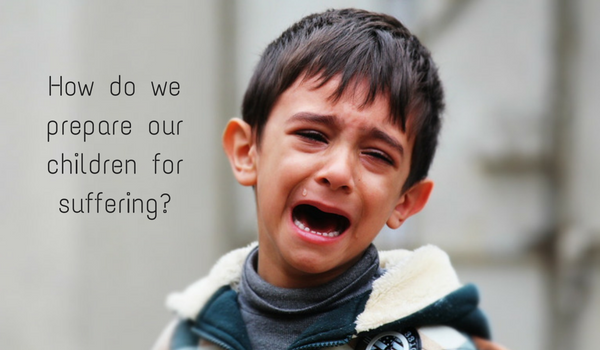
Image: Pixabay
I don’t normally frequent the Desiring God site as my theology has taken a dramatic departure from John Piper’s brand of Christianity.
*Let it be noted that John Piper was a large influence in inspiring me towards global missions, a vocation I dedicated years of my life to—so when I say I departed from his theology, it isn’t a flippant statement but a concise description of a long, painful, identity-shedding and faith shifting process.*
But because of the work I am doing with Unfundamentalist Parenting, I pay attention to influential voices giving advice to parents with spiritual authority. Here, John Piper answers the question, “how do we prepare our children for suffering?”—a relevant and poignant question for all parents as we face the reality of our precious children walking vulnerably into an unkind world.
As can be expected, I agreed with very little of it, as our views on almost everything from Scripture to suffering to discipline come from opposing ends of the theological spectrum. But one thing we have in common is that we both care for children and for parents, and this tender question, “how do we prepare our children for suffering?” is worth addressing.
Let me take two blog posts, this part one to raise one giant metaphorical eyebrow at Piper’s answer. And because Critique and Create are two sides of the same coin, I’ll flip the coin in part two to answer this same question, “how do we prepare our children for suffering?” from an unfundamentalist perspective.
Ready?
Piper sums up his answer into three parts, so I will engage them in the order given:
- Teach your son a glorious, all-encompassing biblical worldview that puts suffering in its proper place.
- Discipline him with appropriate firmness, and require of him self denial.
- Model for him trust and joy in the midst of your own suffering and sorrow.
For Piper, coherence of worldview and the ability to categorize every life experience, including suffering, into a “proper place” is an absolute prerequisite for living life. He believes, as Christians, the Bible must provide all the answers, or at least the correct lens through which to view life events. Certainty is a must. Right doctrine is what will ground us when the unpredictable hammer of life’s suffering comes swinging and knock us off kilter. Here are Piper’s theological stakes:
God created the world as good but it is broken by sin. Our children are not perfect because they are sinful.
Pound that stake in.
God is sovereign. Even when unspeakable suffering occurs. God isn’t helpless.
Pound. Pound.
The suffering we endure is not punishment because Christ bore it all. The suffering that happens to us is God’s “fatherly discipline” for the sake of our holiness.
Pound. Pound. Pound.
God is sovereign. God is wise. God has purposes for us in our suffering.
“Saturate your child with this worldview.” Piper says. The stakes are now firmly in place, and we can hide underneath the safe refuge of the doctrinal canopy.
There is a line between loving instruction and indoctrination and I think John Piper crosses it. Loving instruction is to give our children the vocabulary and tools to express their intuition and give them the autonomy to engage the world with their own ideas. Indoctrination is to insert ideas that are counter-intuitive and beat them (and I wish I meant this metaphorically) into accepting them.
A sovereign God who lets God’s children suffer as “fatherly discipline” cannot be loving. This is so counter intuitive to the human spirit that only indoctrination can make a child accept it. A child trusts that a loving parent will come to their rescue. When babies cry and parents respond to their cries with cuddles and soothing touch, it increases their bond and is an investment in the baby’s emotional resilience. The intuitive, human response is to recoil from harsh parenting. Children don’t want to stay under the canopy of horrible theology, their free spirit wants to fly away.
However.
The teaching John Piper wants Christian parents to do is to control our children, reign them in, so that they stay submissively within doctrinal boundaries. As effective as it may be, it comes with the cost of breaking children’s tender spirits, erases their own intuition, and robs them of the freedom to think for themselves.
If you think I am being overly harsh, look no further to Piper’s second point: “Require him of self denial.” Piper says to spank them, so they are trained to not getting what they want. The spiritual justification for this, according to Piper, is so they “put to death” their “sinful desires.”
First, mentally control your children. Second, physically restrain them.
Both the content and the methods espoused are dominating and abuses the power adults have over children. This is physically, mentally, and spiritually violating of the dignity children deserve. They are small, but their personhood is sacred, and our humanity requires that we create a society in which children are given the time and space to grow into their individual identity without violent oppression.
Lastly, Piper says we are to model trust and joy in the midst of our own suffering for the children to emulate. I wish he had led with this piece of advice, because it is the only one out of the three that I don’t consider an infringement of children’s rights. But even in this, I take issue.
Trust and joy in the midst of suffering is a beautiful inspiration, one that I deeply admire in those who exhibit these qualities, but only if it is borne of authentic display of character. Unfortunately, those who have been taught “self denial” from childhood, have learned to manufacture a superficial joy because they know it is what the Christian community expects of them. They have also never learned the skills to express authentic emotions in a healthy manner.
Certainly, modeling virtue for our children is the best way to influence their own character. But authenticity, the honest wrestling with even the demons of our hearts, is just as important as simply exuding trust and joy without questioning. It’s especially crucial because it validates the negative emotions that rise up within the children’s own hearts as they learn how to struggle in life.
Click here for part 2: 9 Ways to prepare our Children for Suffering.
Want more resources on parenting with progressive values?
Join our Facebook Group, Raising Children Unfundamentalist.












